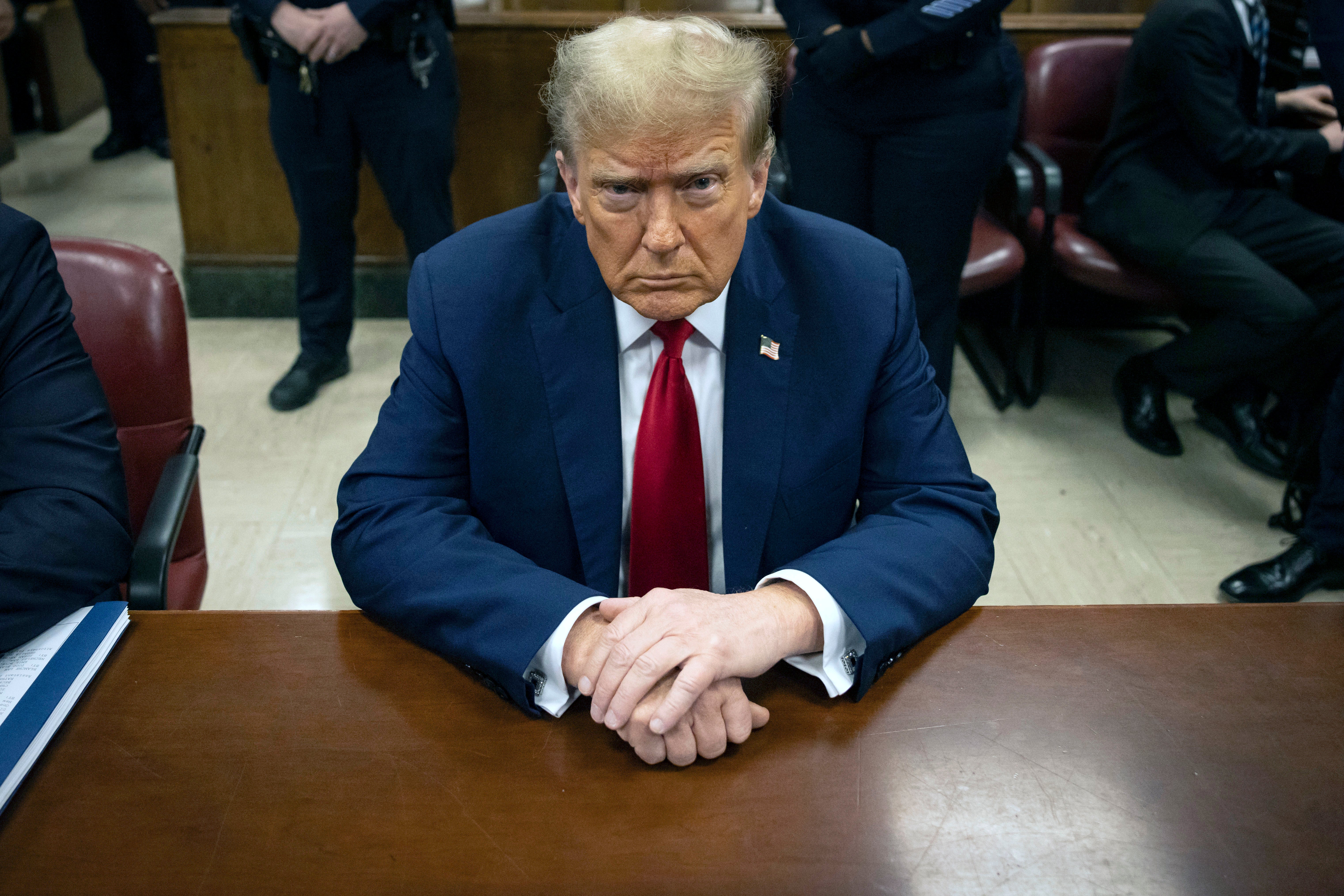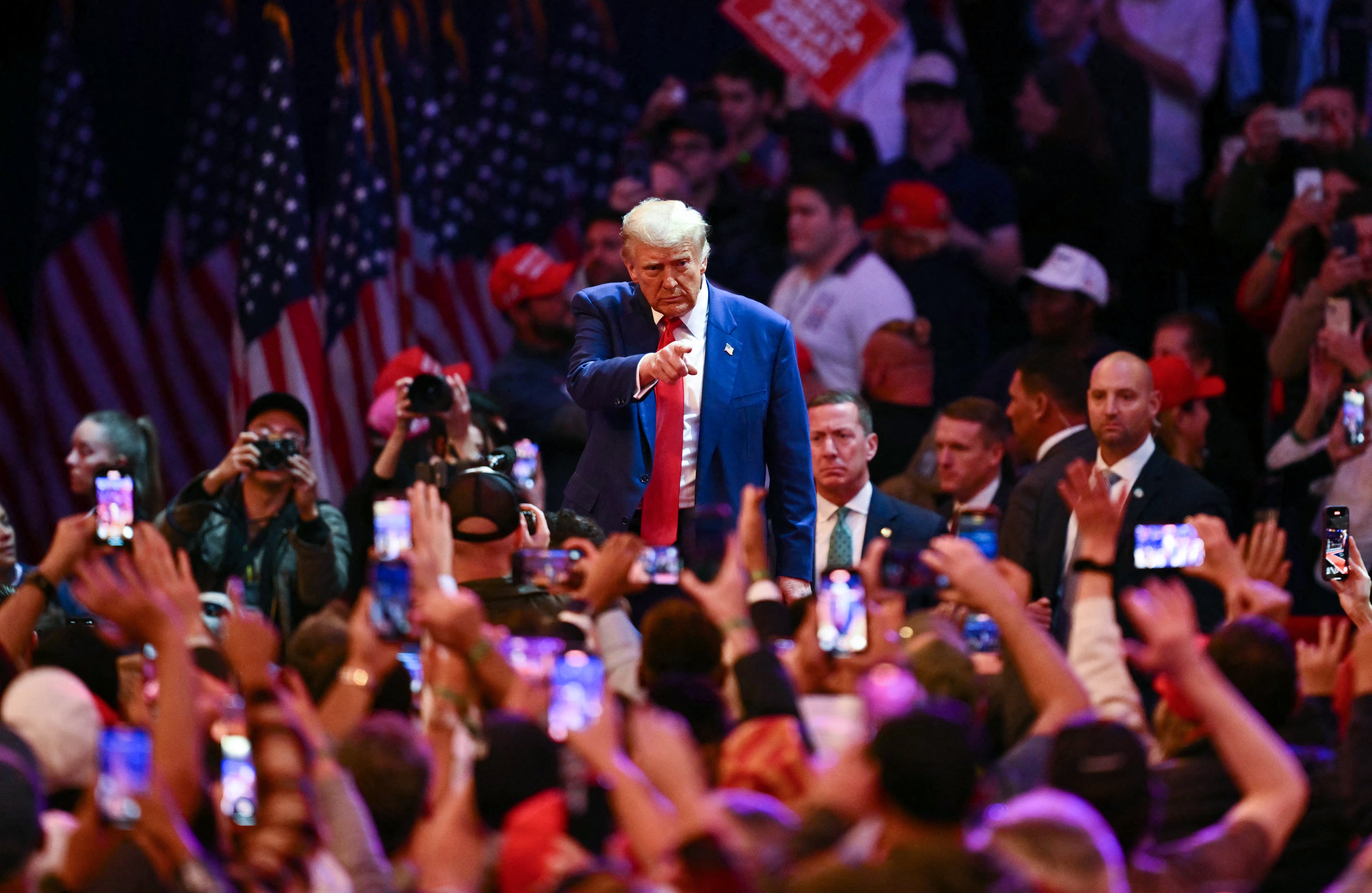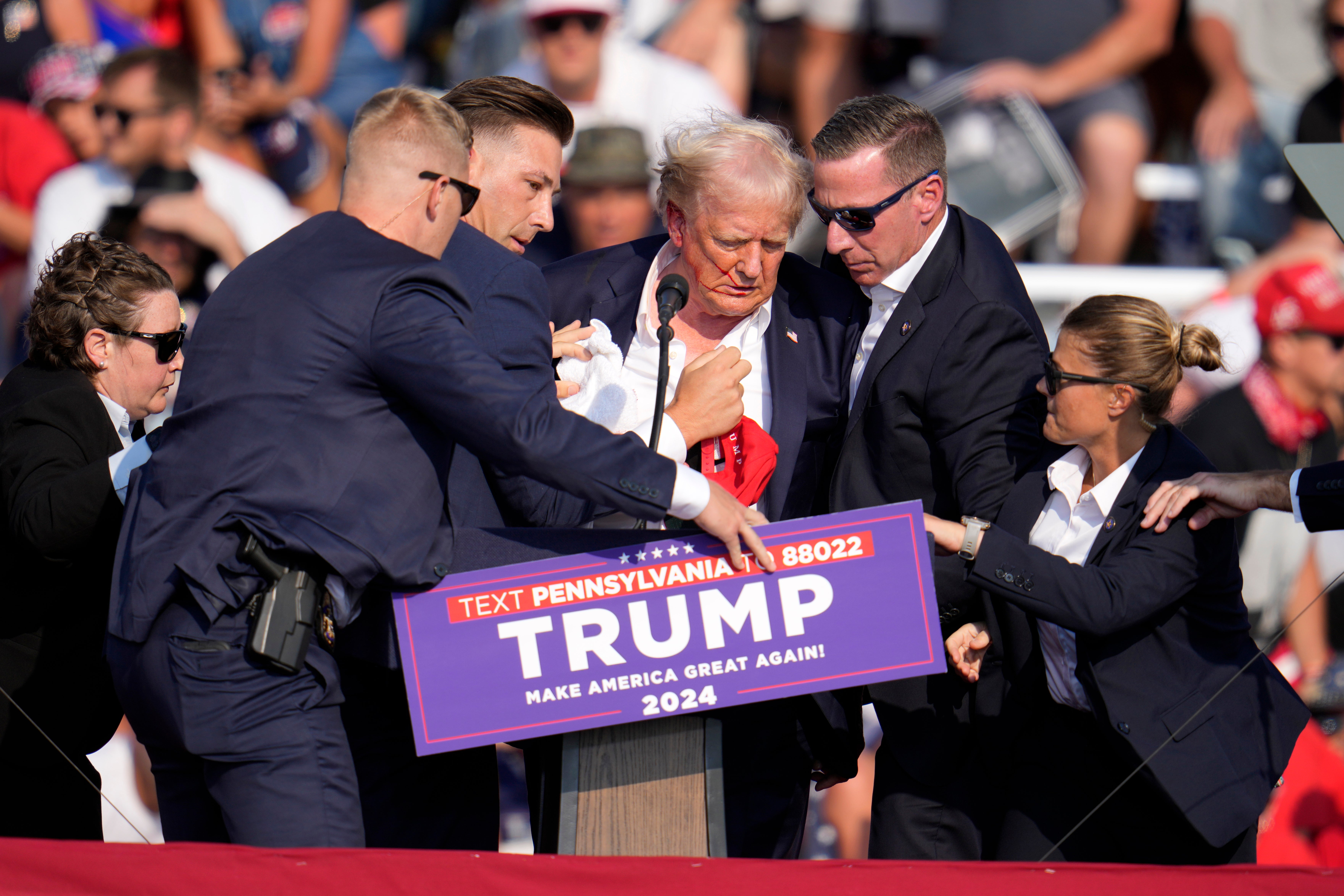Emboldened and unshackled: What a second Trump presidency means for America
ANALYSIS: His third campaign was defined by a promise of retribution and a sharpened nativist agenda to take America back again, Alex Woodward reports
On June 16, 2015, Donald Trump descended from Trump Tower’s golden escalators alongside his wife Melania, with Neil Young’s “Rockin’ in the Free World” blasting in the atrium as he announced his campaign for an election he would eventually win.
The debut of his “Make America Great Again” movement in his Manhattan skyscraper — a slogan draped on the banners behind him — included a speech characterizing the US as the world’s “dumping ground.” Mexico is sending America its drugs, crime and rapists, he said. That was two minutes into his remarks.
Just weeks later, it was inside that same building that he conspired with wealthy publishers and power brokers to block politically damaging stories of his affairs from the public. In the middle of his third presidential campaign nine years later, a jury convicted him on 34 felony counts connected to what prosecutors called his first criminal election interference scheme.
Trump returned to the promise of an anti-immigration regime as the chief pillar of his 2024 campaign against Kamala Harris, one fueled by his failure to overturn the results of the election he lost in 2020, as well as outrage and grievances with a justice system that seeks to hold him accountable.
The former president’s first term in office came to an end in the wake of an assault in the halls of Congress, a violent attempt from a mob of his supporters to do what he failed to do in courts.
His false narrative of a “rigged” election, now central to the criminal cases against him, has animated a second term in office as a mandate to correct what he wrongly tells his supporters was stolen from them.
Trump — seeing himself unshackled by institutional guardrails, acquitted in the Senate after he was impeached twice by the House of Representatives, and defended by a Supreme Court and Republican Party that has been shaped in his image — has viewed the office of the presidency as his own personal vehicle to inflict punishment against his enemies, benefit his allies, and bend the branches of government to his movement’s demands.

“Not only has he not walked away from his attack on democracy in and around January 6, but he’s continuing to center it,” says Donald Sherman, director of Citizens for Responsibility and Ethics in Washington, a nonpartisan watchdog group that has mounted several legal challenges against Trump’s administration and campaign.
“A second Trump term will not abide by any rules or norms to rein in the president’s worst inclinations,” he tells The Independent.
Trump’s antidemocratic agenda and embrace of a Supreme Court he believes has absolved him of wrongdoing and affirmed his “immunity” for crimes in office “are screaming red warning signs” that a second Trump term signals a “substantially less restrained” administration than his first four years in office.
“There will not be institutions — in the courts, in Congress — to rein in those abuses,” Sherman says.
Three weeks from Election Day, Trump is set to be sentenced in a criminal courtroom in Manhattan, in the same city where he launched his presidential ambitions, and where a jury of his hometown peers found him liable for sexual abuse and defamation, and where a judge ordered him to pay more than $350 million for defrauding banks and investors. The man who built his public persona on an image of self-made success and shrewd business judgment is on the hook for more than half a billion dollars, not including tens of thousands of dollars in legal fees he has amassed in courts across the country.
He insists he has not done anything wrong.
Trump’s campaign was defined by two lasting images: a mugshot from his surrender to authorities in Georgia, where he is criminally charged for his attempts to overturn that state’s election results, and a photograph in which a bloody Trump raises his fist in defiance after a failed assassination attempt in Pennsylvania — photographs his supporters have worn on T-shirts and posted online as evidence of his inevitability.
Trump formally launched a third presidential campaign from Waco, Texas, on the 30th anniversary of the Branch Davidians’ lethal standoff with federal law enforcement agents. There, he declared himself “retribution” in a campaign of revenge against his political rivals.
His remarks opened with a song from a prison choir of men jailed in connection with the Capitol attacks. The former president framed the upcoming election as a “final battle.”
“I am your warrior. I am your justice,” he told his supporters. “To those who have been wronged and betrayed, of which there are many people out there, I will be your retribution.”
Trump has promised mass pardons for the hundreds of people convicted on charges connected to January 6 — criminal defendants he calls “hostages” and “patriots.” He has embraced the J6 Prison Choir, a group of defendants who remain in a Washington, DC, jail for crimes that, according to federal prosecutors, “were so violent that their pretrial release would pose a danger to the public.”
He has spent months attacking the judges overseeing the cases against him and the prosecutors and attorneys general pursuing them, and has failed to stop his supporters from a deluge of threats and harassment that have terrorized court staff and their families.
His campaign raised millions of dollars from those cases and the outrage he feeds his supporters about them. Political persecution is also coming for them, he tells them.
He has celebrated a judge he appointed for dismissing a federal case involving his retention of classified documents at his Mar-a-Lago compound, while the judges overseeing the other criminal and civil cases against him are “evil” and “corrupt.” Prosecutors who have sued or indicted him are “mentally deranged.” The special counsel prosecuting Trump for election interference and obstruction should be “thrown out of the country.”
The Supreme Court — which includes three justices appointed under Trump’s first term in office, as well as two long-standing justices with ties to right-wing activists and influential Republican donors — has affirmed Trump’s “immunity” from certain crimes in office, a ruling that will likely embolden his pursuit an agenda unmoored from constitutional guardrails.
Two conservative justices nearing potential retirement could step down and open the door for Trump to nominate more far-right members of the nation’s highest court, affirming its conservative majority for more than a generation, long after his presidency.

“His campaign has been a prolonged assault on democracy,” says Rachel O’Leary Carmona, director of the Women’s March, which emerged from a global response to Trump’s threats to women’s rights.
“He should not even be able to run based on the fact that he fomented an insurrection, and the court that he corrupted has its finger on the scales of justice to ensure that he could evade accountability on that issue,” she tells The Independent.
Trump has publicly, repeatedly told Americans what he plans to do, including prosecuting his perceived political enemies, restraining the press and eviscerating civil service protections, Sherman says. The former president “is making clear to everyone else that works in the government that it’s his way or the highway, and that loyalty to him supersedes loyalty to the law or the Constitution,” he says.
The Supreme Court has “already written him a blank check to commit crimes in office,” according to Sherman, “and the Senate has already indicated that they do not have the stomach to stand up to President Trump.”
Trump has labeled his adversaries “vermin” and warned that immigrants are “poisoning the blood” of the country, rhetoric drawing direct comparisons to the pages of Mein Kampf and white supremacist manifestos. In the final weeks of his campaign, he warned against an “enemy within” that poses a greater threat to the country than any foreign power.
In the days before polls closed, he sued a news network for $10 billion, his wealthiest donor promised “hardship” for Americans in Trump’s economy, the highest-ranking congressional Republican outlined “massive” cuts to millions of healthcare plans, vaccine skeptic Robert F. Kennedy Jr. was touted to lead the nation’s health agencies, and Trump himself suggested one of his most vocal critics from his own party — a former congresswoman he endorsed facing televised military tribunals — should see what it’s like to have “guns trained on her face.”
He held a “closing argument” rally in Madison Square Garden in his former New York City home, with an hours-long program of derogatory attacks that his critics compared to a Nazi-supporting event in the same arena decades earlier.
Trump and his allies have accused their rivals of fear mongering, or turn accusations of “fascism” against their opponents for criticizing their rhetoric — what authoritarianism scholar Ruth Ben-Ghiat calls “authoritarian projectionsim.”
His history of dehumanization has primed his supporters to see political opponents as subhuman, language that gives his allies permission to degrade the “other” and prime their acceptance of the violence to come, while absolving them of responsibility for it, Ben-Ghiat told The Independent as Trump launched his campaign.

“You depict immigrants bringing disease into the country, you depict them as polluting our blood, you depict them in ways that create a generalized fear — these are fascist tactics,” she said. “Everything he’s doing, these are fascist tactics.”
Trump has broadly embraced reshaping or eliminating federal regulations and agencies while opening the door to staffing the government with a politicized federal workforce to do what he could not in his first administration.
He has distanced himself from the Heritage Foundation’s Project 2025 agenda for the next Republican president, though the policies he has publicly supported largely mirror the expansive document.
His allies have promised to fill the government with loyalists, use the military as his domestic law enforcement, strip civil rights protections for LGBT+ Americans, abolish public education, and expand the number of crimes punishable by death, while speeding up executions for people on death row.
Americans would bear the economic brunt of new tariffs on imported goods. States would be allowed to eliminate abortion access, which is no longer a constitutional right after the Supreme Court’s decision to overturn Roe v Wade, made possible by the three justices Trump appointed.
Trump will have a “more capable and craven apparatus” supporting his second term, compared to the administration he installed in his first four years in office, according to Sherman.
Americans should have “every expectation” that Trump plans to accomplish those goals,” he says.
“I think 1950s America — despite the fact that it was still mired in deep inequality, some of which we’ve addressed, and some of which we haven’t — would be very confused about the rhetoric coming out of the Republican Party right now,” O’Leary Carmona says. “Thinking about a time in which being against fascism would be considered a pejorative term.”
Americans are exhausted by a politics that is “rooted in grievance versus hope, and ego versus community and enemies versus neighbors,” she says.
Join our commenting forum
Join thought-provoking conversations, follow other Independent readers and see their replies
Comments
Bookmark popover
Removed from bookmarks